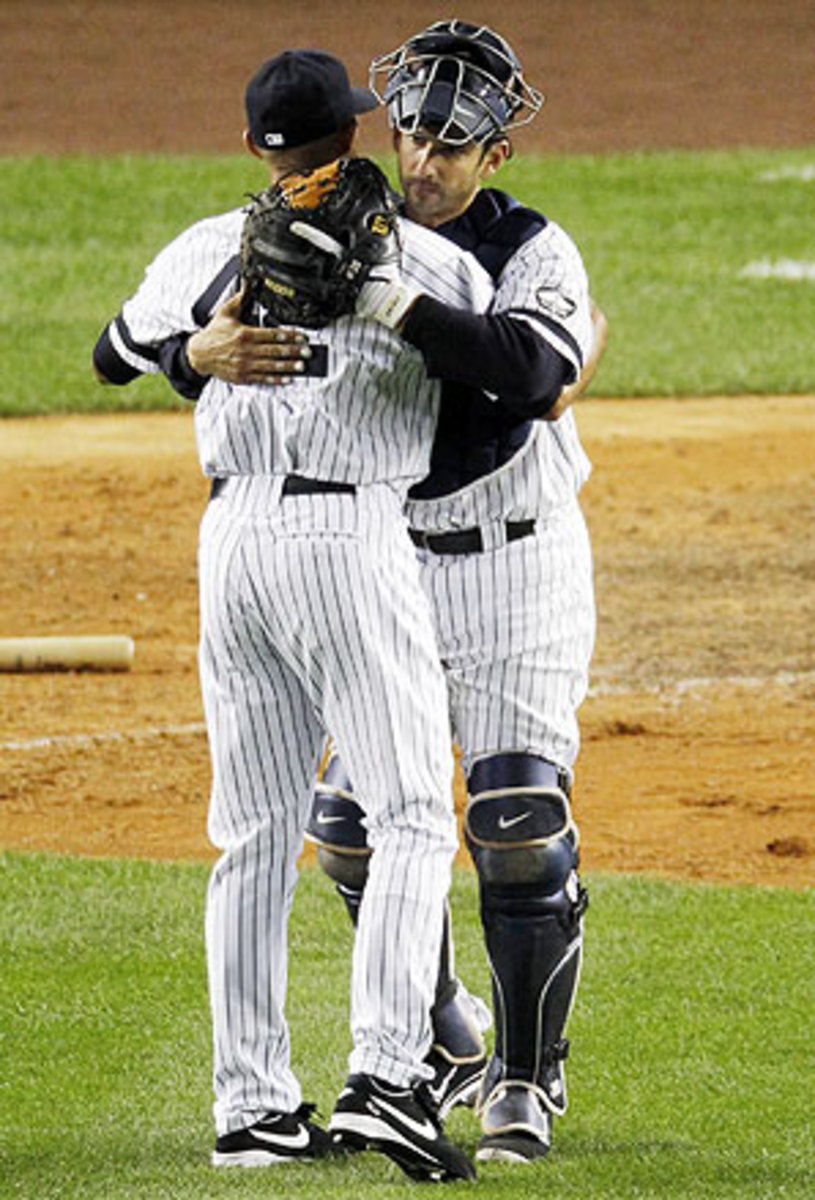Five Cuts: As other closers stumble, Rivera simply marches on
ATLANTA -- Welcome to the club, Aroldis Chapman, Brian Wilson and Darren Oliver. In consecutive Division Series games Friday and Saturday, the three relievers joined the legions of pitchers who have blown a postseason save since Mariano Rivera blew his last one six years ago. The count is now 36 pitchers since Rivera spit one up.
Remember last postseason, when Rivera won the closers' Survivor competition? He was the only one of the eight postseason closers not to blow a save or lose a tie game late -- a big reason why the Yankees won the tournament.
This season is taking on a similar look. The Reds, Giants and Rangers all held leads in the eighth inning and couldn't finish it off. The Reds couldn't get to their closer, Francisco Cordero, the Giants lost Game 2 to the Braves in asking Wilson to do a Rivera impersonation (a six-out save) and the Rangers didn't even bother asking closer Neftali Feliz to be like Mariano, and lost by entrusting the eighth inning outs to Oliver (and, once tied, to Feliz) in .
And yet there was Rivera once again last night, as if time has stood still all these years, shutting down another game and another series.
Okay, the Yankees handed him a big fat lead this time against the overwhelmed Twins, 6-1. But he did save Games 1 and 2. And the October tableau of Rivera as the last man standing never seems to change.
The Twins are a nice team. Fine organization. Great fans. Sound fundamentals. But do we really want to see them in another postseason with the same kind of strike-throwing, pitch-to-contact pitching philosophy? These guys are baseball's Boise State. Easy to root for, fine inside the AL Central, but they're not major conference timber.
Minnesota's wipeout against New York and its potent lineup was entirely predictable. The Twins have a below-average staff when it comes to getting swings and misses and getting strikeouts, quick barometers of how to measure up against good hitting teams in October.
In losing 12 straight postseason games, the Twins' starters have averaged only 5.7 strikeouts per nine innings -- about 15 percent worse than all teams averaged this regular season. The franchise hasn't had a starter punch out 10 batters in a postseason game since Walter Johnson in 1925, when it played out of Washington as the Senators.
Carl Crawford is going to make a boatload of money this offseason as a free agent. He's a great player who will get interest from big money teams (Yankees, Tigers, Angels, Red Sox, etc.) and now looks like he might be starting to gain the Beltran Bonus Effect with a strong postseason.
Crawford showed his skills on the big stage yesterday with two fabulous catches in left field and two hits, including a big ninth inning home run. And he has little help behind him because Evan Longoria clearly isn't right after missing 12 days with that quad injury. Crawford just turned 29 years old, has the body frame to age well and the power to still be a middle of the order hitter even if he loses half a step as he ages. He's a safe buy.
The loss of closer Billy Wagner to an oblique injury means Bobby Cox's Baby Braves bullpen will be entrusted with even more responsibility. Cox still has veterans Peter Moylan and Kyle Farnsworth, but don't be surprised if rookies Craig Kimbrel or Jonny Venters is asked to protect a ninth inning lead if Atlanta holds one.
If the postseason is more about stuff than it is experience, the Braves are still in good shape. Here are the five Baby Braves, their average fastball velocities and career strikeout rate per nine innings and saves:
Giants manager Bruce Bochy seems to leaning toward throwing Tim Lincecum on short rest in Game 4 if San Francisco needs the win to stay alive. Of course, he really doesn't have another option as long as he believes that Lincecum is physically fine with three days of rest -- and he does.
Yes, Lincecum never has thrown on short rest (never had a reason to do it, either) and he threw 119 pitches in Game 1 (but kept his mechanics clean and had very few stress innings). But the key to Bochy even having this option is that Lincecum, at some prodding from the Giants, stepped up his fitness and training over the past month or so. When Lincecum stumbled badly in August, the Giants were concerned that he was fatigued from not staying properly conditioned through the grind of the second half. Lincecum altered his workouts, and he is much stronger and fitter than he was in August.






